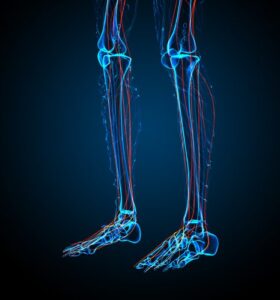Also known as diabetic peripheral neuropathy, diabetic nerve pain is an incredibly painful and common complication of both Type 1 and Type 2 Diabetes. Unlike muscle pain which typically goes away after time and/or treatment, nerve pain is longer lasting and in some cases permanent. [Read more…]
The Link Between Cancer Treatment and Peripheral Neuropathy
When the peripheral nerves in our hands, feet, arms and legs are damaged, they can send sensations or feelings of pain and discomfort to the brain via the spinal cord. This is known as Peripheral Neuropathy and affects millions of people across the United States.
Anti-Inflammatories With Peripheral Neuropathy Won’t Work
For many people, their first reaction to pain is to turn to traditional painkiller medication such as ibuprofen or aspirin for relief. The anti-inflammatory properties of these painkillers make them a popular solution for pain and they are consequently used to treat many different ailments. So it makes sense that those who begin to experience pain and discomfort from peripheral neuropathy would naturally reach for the same painkillers to help manage their symptoms.
Does Peripheral Neuropathy Get Worse Over Time?
Once a person begins to experience the discomfort of peripheral neuropathy (PN), it is likely that they will continue to feel the symptoms for the rest of their lives. There is no known cure for peripheral neuropathy, but there are treatments that can help patients manage the symptoms and prevent it from getting worse.
What Medication to Avoid with Peripheral Neuropathy
Because there are so many readily available medications, including pain meds, on the market today, it is no wonder that many people are conditioned to reach for a pill the moment they feel any pain or discomfort. For some, the pain doesn’t even have to be that serious before they will take medication to treat it. This can definitely be a temptation for those who experience the symptoms of peripheral neuropathy.
Footwear and Peripheral Neuropathy
Millions of people across the country are dealing with uncomfortable and debilitating peripheral neuropathy. If you’re one of them, it may feel like there is nothing that can be done to help the irritating numbness, burning, and pain in your legs and feet. Figuring out a way to manage the pain can become a daily challenge that can consume your thoughts and time.
Signs of Peripheral Neuropathy You May Not Know
Communication Matters
Manifestations of peripheral neuropathy (PN) occur when nerves responsible for communicating messages from the brain and the spinal cord throughout the body start to malfunction as a result of damage or disease. Peripheral nerves which extend from the spinal cord allow for vital communication to ensure the proper functionality of our internal organs, muscles, and even our own skin. Individuals with PN who proactively consult with a qualified medical professional to establish an individual treatment plan may benefit from avoiding undue harm or injury.
Do I Have Peripheral Neuropathy?
There has been quite a bit of attention and focus given to peripheral neuropathy recently in the health community. Some people are just hearing about it for the first time and wonder if they might be experiencing symptoms without knowing. This is especially true for people who are most likely to get peripheral neuropathy, such as diabetes patients and those who may have gone through chemotherapy.
- 1
- 2
- 3
- 4
- Next Page »













